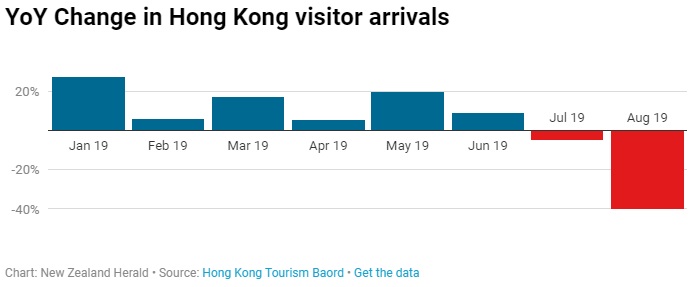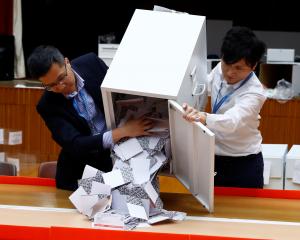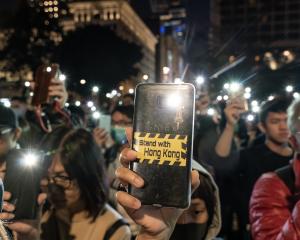
Wary of the civil unrest and street protests, visitors are staying away from normally popular international attractions such as Disneyland Hong Kong and the Ocean Park amusement parks.
Arrivals are down 40 per cent, Financial Secretary Paul Chan Mo-po wrote in a blog post.
Speaking with hoteliers and members of the hospitality industry, the Fincancial Secretary wrote that the unrest has had widespread effects and businesses are worried that there are no signs of conditions improving.
"According to the trade, hotels in some locations had seen occupancy rates drop to about half, while room rates plunged 40 to 70 per cent," he wrote.

This plunge in visitor numbers is the biggest drop in arrivals since the Severe Acute Respiratory Syndrome (SARS) outbreak in 2003.
"We have suffered a huge blow from the protests," Wong Ka-ngai, chairman of the Hong Kong Tour Guides General Union told SCMP. The union which represents over half of the city's 6000 guides has estimated that a tenth of tour operators were able to generate profit in the current climate.
Historically July and August is peak season for visitors to the city, which is a worrying prospect for the rest of the year as the unrest shows no sign of resolving.
"The most worrying thing is that we are not seeing any signs of a recovery … September will be a painful month," said Wong.
The unrest which began as a protest against an extradition bill to send prisoners to mainland China has continued into a 14th week.
Those visitors who do make the journey to Hong Kong will find bargain room rates, although many of the city's shops and attractions are eerily quiet.
Yiu Si-wing, chairman of China Travel Service Hong Kong estimates an almost 50 per cent drop in hotel rates.

Rooms in the Ibis hotel in Sheung Wan are selling for $100 a night, almost half the historical price found on online booking websites. With hotels across the city dropping to below half occupancy, the unrest has been bad news for hospitality but good for room choice.
Yet even this has not convinced tourists to come back to the south China metropolis.
Talking to the SCMP, Yiu says "the biggest problem is not price or marketing, but that people have lost confidence."
Even Disneyland, China's most expensive theme park and Hong Kong's big drawcard for tourists across south Asia. The Post reported that some shops and restaurants had been closed.
A spokesperson for Disney said that they would be releasing attendance figures at a later "at an appropriate time." The park which is undergoing major construction to the 'Disney Castle' centrepiece was already anticipating slightly lower figures.
However, visitors have been delighted by the absence of queues for rides, if some of the amusement park's atmosphere was lacking.

This was great news for the Disney fans who could reach the park. However many travellers were caught up in last week's transport chaos caused by riots at metro hubs and vandalism by protester's.
Last week damage to public transport and metro ticketing turnstiles was another reason for low park attendance, with MTR estimating repair work could last days.
"As the damage caused today was very severe, some of the stations may not be able to resume their operations [Monday]," the company said in the statement at the beginning of last week.
Disneyland shares a metro line to Hong Kong airport which has been another focus for protests.
In spite of this sudden drop in tourism, annual visitor numbers to Hong Kong continue to grow steadily, up 35 per cent over the past decade.
Hong Kong's Tourism Industry can only wait for the unrest to resolve and visitor confidence to return, but at this moment there is no end in sight to the protests as they draw in to their 15th week.













